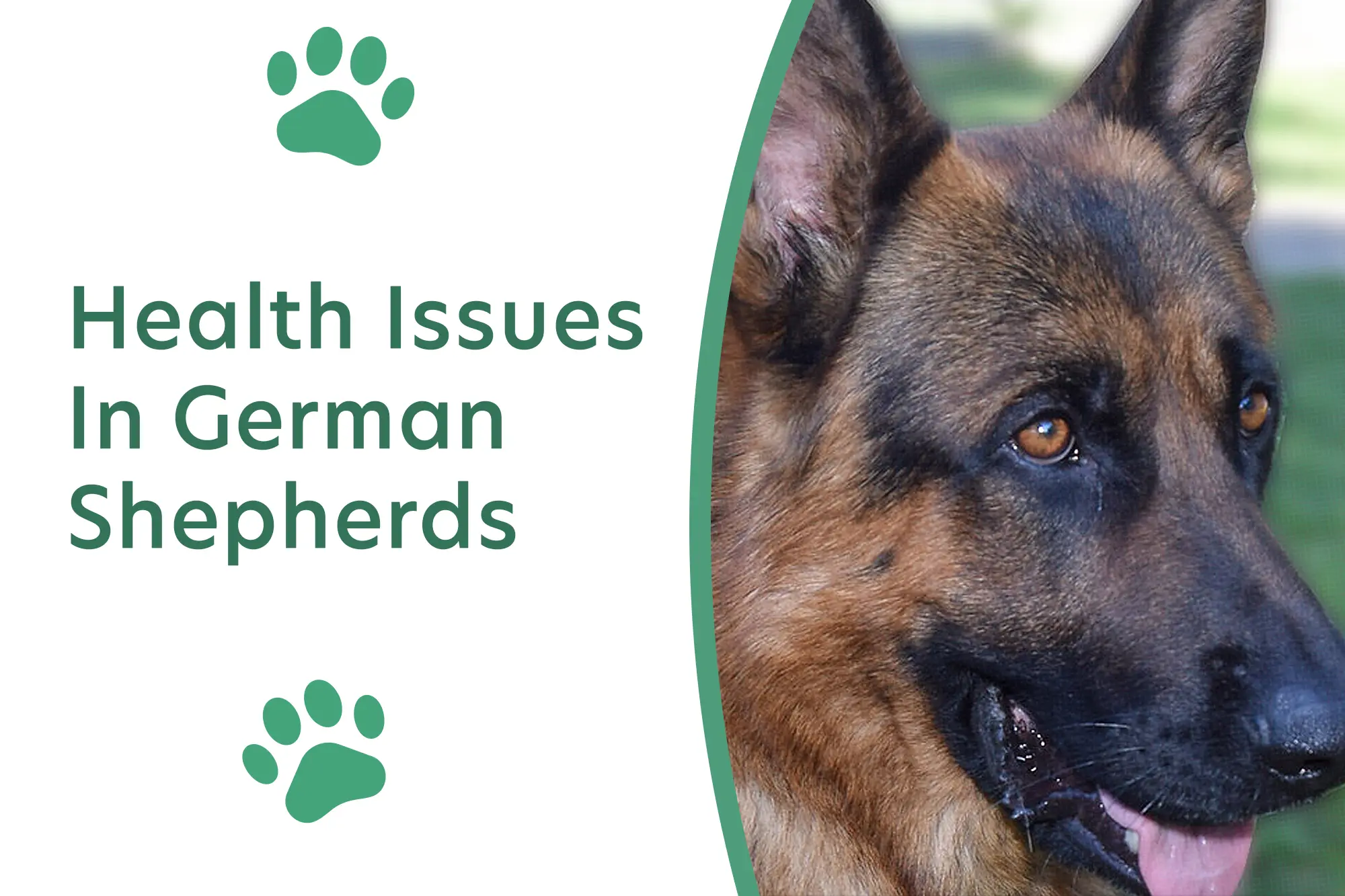German Shepherds are an iconic breed known for their intelligence, loyalty, and incredible work ethic. While these dogs are some of the most steadfast companions you can find, they are not free from their own set of health concerns.
Let us take an in-depth look at the symptoms, treatment options, and preventive measures to ensure that your Shepherd stays healthy and happy.
 German Shepherds At A Glance
German Shepherds At A Glance
Family: Canidae
Class: Mammalia
Length: 22 to 24 inches (Male) and 20 to 22 inches (Female)
Lifespan: Average of 10 years, can live up to 12 years
Weight: 65-75 pounds (Male) and 55-65 pounds (Female)
Energy Level: Average
Intelligence Level: Very High
Hip Dysplasia
Symptoms
Hip dysplasia is a common orthopedic issue in German Shepherds, resulting from an improperly formed hip joint. Symptoms include:
- Decreased activity
- Difficulty standing up or climbing stairs
- Pain when touched around the hip area
- Limping or an unusual gait
Diagnosis and Treatment
Your veterinarian will perform a thorough physical exam, including range-of-motion tests for the hips, and X-rays to evaluate the severity of the condition. Treatment options include weight management, physical therapy, joint supplements, and anti-inflammatory medications to alleviate symptoms. Severe cases may require surgical intervention.
Prevention
To help prevent hip dysplasia in German Shepherds, choose puppies from a reputable breeder that tests their breeding dogs for the condition. Maintaining a healthy weight and engaging in age-appropriate exercise can also help prevent or reduce the severity of hip dysplasia.

Elbow Dysplasia
Symptoms
Elbow dysplasia is another orthopedic issue that affects the front legs of German Shepherds, causing pain and arthritis. Signs of elbow dysplasia include:
- Limping or favoring a front leg
- Swelling around the elbow joint
- Pain when touched near the elbow
- Stiffness or discomfort after exercise
Diagnosis and Treatment
Diagnosis is typically based on a physical examination, manipulation of the affected limb, and X-rays. Treatment options are similar to those for hip dysplasia, with a focus on weight management, physical therapy, and anti-inflammatory medications. In some cases, surgery may be necessary to alleviate symptoms and improve mobility.
Prevention
Choose a reputable breeder that tests for elbow dysplasia in their breeding dogs to minimize the risk. Encourage age-appropriate exercise to maintain joint health and muscle strength.

Degenerative Myelopathy
Symptoms
Degenerative myelopathy is a progressive neurological disorder that affects the spinal cord, leading to a gradual loss of mobility in German Shepherds. Early symptoms include:
- Dragging or scuffing of the rear paws
- Difficulty getting up from a laying position
- Wobbly gait
Later stages of the disease may lead to complete paralysis of the hind legs.
Diagnosis and Treatment
Diagnosis of degenerative myelopathy is primarily based on clinical signs and ruling out other possible causes. There is currently no cure for the disease, but supportive care focusing on maintaining mobility and managing discomfort can improve the quality of life for affected dogs.
Prevention
There is a genetic test available to identify dogs at risk for developing degenerative myelopathy. Avoid breeding dogs that carry the gene mutation responsible for the disease to reduce its prevalence.
Bloat (Gastric Dilatation Volvulus)
Symptoms
Bloat is a life-threatening emergency that occurs when a dog’s stomach fills with gas and twists on itself. Symptoms include:
- Attempts to vomit without producing anything
- Swollen abdomen
- Pacing and restlessness
- Excessive drooling
Diagnosis and Treatment
Bloat requires immediate veterinary intervention. Your veterinarian will confirm the diagnosis using X-rays and will treat the condition by decompressing the stomach, removing excess gas, and performing emergency surgery to correct the twist, if necessary.
Prevention
To reduce the risk of bloat, feed your German Shepherd smaller meals throughout the day, encourage slow eating, and avoid strenuous activity immediately after eating.
Allergies
Much like their human counterparts, German Shepherds, aren’t invincible when it comes to allergies. German Shepherds could present symptoms of three major types of allergies: food allergies, environmental allergies, and flea allergy dermatitis.
Food Allergies
Food allergies occur when a German Shepherd’s immune system mistakenly identifies a particular food ingredient as harmful. The most common culprits are beef, dairy, wheat, egg, chicken, lamb, soy, pork, rabbit, and fish.
Environmental Allergies
Also known as Atopy, environmental allergies stem from an allergic reaction to environmental substances like dust mites, molds, pollens from grasses, trees, and flowers.
Flea Allergy Dermatitis
This type of allergy is a reaction to flea bites, more specifically, to the flea’s saliva. Even one or two bites can trigger an allergic response in sensitive dogs.
Symptoms of Allergies
Allergies can trigger an array of discomforting symptoms:
- Skin Issues: Itchy, red, moist, or scabbed skin, increased scratching, and frequent licking or chewing of specific body regions are common signs.
- Ear Problems: Chronic ear inflammations, head shaking, or scratching at the ears may indicate an allergic reaction.
- Respiratory Distress: Allergies can also cause coughing, sneezing, and wheezing, along with a runny nose and watery eyes. Some dogs may suffer from gagging.
- Digestive Issues: If your German Shepherd suffers from some food allergy, it can cause vomiting, diarrhea or chronic gas.
Diagnosis of Allergies
Diagnosing allergies can be a long process as it involves identifying the allergens triggering the reactions. For food allergies, an elimination diet is often recommended, where potential allergens are removed from the diet and slowly reintroduced to isolate the allergen. Blood tests and skin tests are also commonly conducted to identify environmental allergies.
Flea allergy dermatitis is typically diagnosed by identifying fleas or flea excrement on the dog’s body along with a prevalent pattern of itching and inflammation.
Treating Allergies
The treatment of allergies in German Shepherds largely depends on the type of allergy and severity of symptoms.
- Food Allergies: Once identified, the offending ingredient is removed from the dog’s diet. Hypoallergenic diets might be recommended in certain cases.
- Environmental Allergies: In case of unavoidable allergens, antihistamines, corticosteroids, or allergy vaccines may be prescribed. Frequent baths with hypoallergenic shampoo can also provide temporary relief.
- Flea Allergy Dermatitis: Flea control is paramount in these cases. Your vet may recommend effective topical or oral flea control products.
Prevention of Allergies
Prevention strategies would include a balanced diet to bolster your German Shepherd’s immune system. Regular grooming can help monitor skin health and control fleas. High-quality flea control products should be used year-round. Limit exposure to known environmental allergens as much as possible, especially during allergy seasons.
Conclusion and Additional Tips for a Healthy German Shepherd
While these health issues are common in German Shepherds, a proactive approach to preventive care, regular veterinary checkups, and a nutritious, balanced diet can go a long way in maintaining your dog’s overall health. Remember, staying informed and attentive to your German Shepherd’s needs is the best defense against these common health issues.
